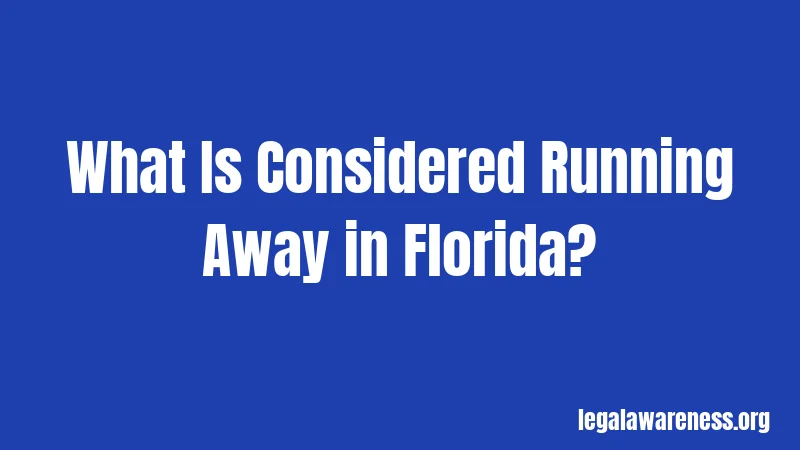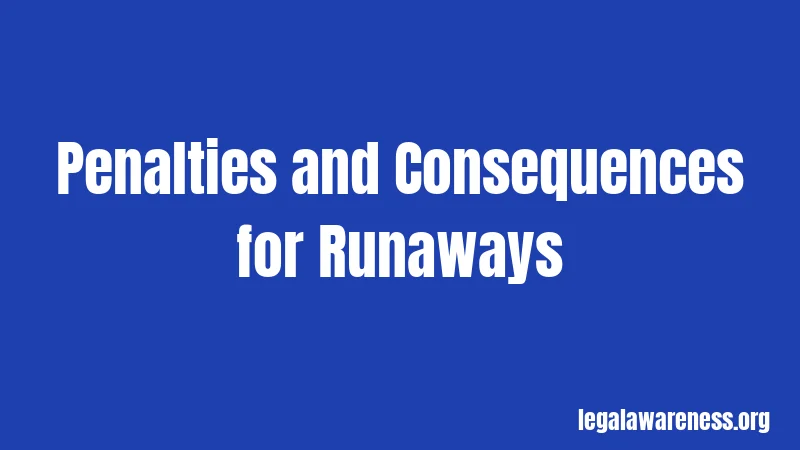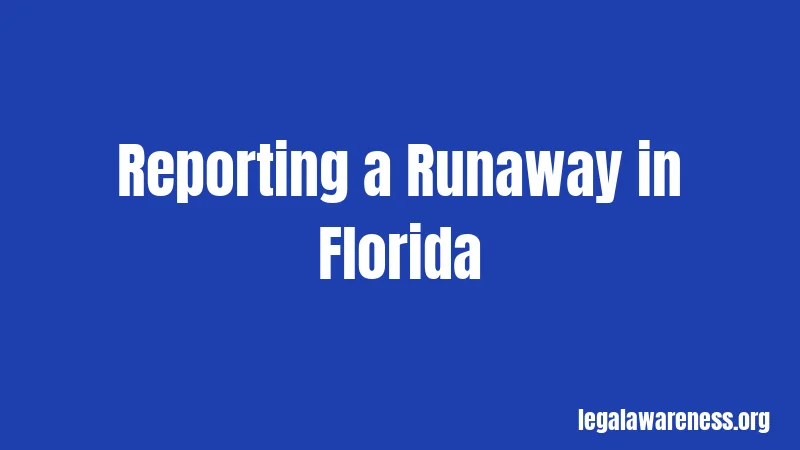Florida Runaway Laws (2026): What Parents and Teens Need to Know
Most people don’t realize how seriously Florida treats runaway situations. Honestly, the rules might surprise you. But if you’re a parent, a teen, or a guardian in Florida, you need to understand these laws. They affect what happens when a young person leaves home without permission.
Here’s the thing: Florida has specific rules about what counts as running away. It also has clear consequences and ways to get help. Let’s break down exactly what you need to know so you’re not caught off guard.
What Is Considered Running Away in Florida?

Running away sounds simple, right? But Florida law defines it pretty specifically. When a child under 18 leaves home without permission and stays away, that’s the basic definition. The young person doesn’t come back home or let their guardians know where they are.
The law recognizes that there’s a difference between a few hours and staying gone overnight. Florida cares about intent too. Did the child mean to run away? Or did something else happen? These details matter when it comes to what actually happens next.
It’s basically about a minor abandoning their legal residence. The child deliberately leaves their parents or guardians and doesn’t return for an extended period. Usually, that means more than 24 hours, but the exact timing can vary based on circumstances.
Basic Florida Runaway Laws
What Makes Someone a Runaway in Florida
Let me break down the official definition. A child is considered a runaway in Florida when they’re under 18 and abandon their home. They do this without parental or guardian consent. They stay away for an extended period without good reason.
Wondering if a one-night sleepover counts? Generally, no. A single night at a friend’s house with permission isn’t running away. But leaving without telling anyone and staying gone for days definitely is. The key is the intent and the length of time away.
Florida law also considers it running away if the child leaves a court-ordered placement. If a kid is supposed to be in foster care or a state facility and leaves, that’s also considered running away. Same rules apply even though the situation is a bit different.
Florida Statute on Runaways
Here’s where it gets important. Florida Statute 39.01 defines what counts as a “runaway child.” The statute is part of Florida’s dependency laws. It deals with how the state handles at-risk youth and family situations.
When a child is reported as a runaway, Florida law gives authorities specific powers. They can legally search for the child. They can take custody if needed. They can access certain information to locate the young person. Stay with me here, because this affects what happens next.
The state can also involve the Department of Children and Families. This agency steps in when there are concerns about abuse, neglect, or abandonment. Running away sometimes signals deeper problems at home. Florida recognizes this connection and responds accordingly.
Penalties and Consequences for Runaways

Okay, this is where things get serious. Runaways in Florida can face legal consequences. But here’s what surprises most people: the child isn’t always the one facing criminal charges.
A minor who runs away could be classified as a dependent child. This means they might come under court supervision. The state could require counseling or family services. In serious cases, the child might be placed in foster care temporarily. Think of it like the court stepping in to protect and help, not necessarily to punish.
Running away can also complicate other legal situations. If the child is already under probation or involved with the court system, running away makes things worse. It can affect custody arrangements or custody decisions.
The real consequences often involve family services and court involvement. The child might have to attend counseling sessions. The parents might be required to participate in family therapy. A juvenile judge could issue orders about where the child must live or restrictions on their activities.
Is Running Away a Criminal Offense in Florida?
Here’s something important to know. Running away itself isn’t a crime in Florida for the minor. The young person won’t get arrested and charged with a crime just for leaving home. Technically, a child can’t be charged criminally for status offenses like running away.
But—and this is a big but—the situation can lead to other criminal charges. If the child gets into trouble while away, that’s different. If they steal food, break into a building, or do anything illegal, those are actual crimes. The running away itself isn’t the criminal act, but what happens while they’re gone can be.
However, the parents or guardians could face charges. Knowingly allowing your child to run away without taking steps to find them might violate child endangerment laws. That’s why parents need to take runaways seriously and report them to police.
What Happens When a Child Is Found
When police locate a runaway, they don’t just drop them off at home and say goodbye. Law enforcement will contact the parents or guardians immediately. The child will typically be taken to the police station or a youth shelter first.
Florida may initiate a dependency investigation. Social workers will talk to the child and parents. They’ll try to figure out why the child ran away. Was it abuse at home? Neglect? Serious family conflict? Mental health issues? Understanding the reason helps determine next steps.
The child might be held in a secure facility temporarily. This isn’t a prison, but rather a juvenile detention facility or youth shelter. Florida does this to keep the child safe while authorities investigate. The length of stay depends on the situation and the investigation findings.
Why Kids Run Away and How Florida Responds
Running away isn’t random. Kids usually run away because something feels wrong at home. Maybe there’s abuse or neglect. Maybe parents have a substance abuse problem. Maybe there’s serious family conflict or mental health struggles. Sometimes it’s a combination of things.
Florida’s system tries to address the underlying problems, not just punish the running away. If investigators discover abuse, they can file for dependency. This removes the child from the unsafe situation. The state then works on reunification or finding a safe placement.
If it’s a conflict issue without abuse, the state might order family counseling. Both the parents and child attend sessions with a professional. A therapist helps them communicate better and work through issues. Honestly, this is usually the better approach than just telling a kid to stay home.
Reporting a Runaway in Florida

So what do you do if your child runs away? First, call the police. Report your child as a missing person or runaway immediately. Don’t wait and hope they’ll come home. Time matters in these situations.
Give police a detailed description. Include what your child was wearing, physical characteristics, and any identifying marks. Tell them about places your child likes to go. Provide information about friends or people the child might contact. The more details you give, the better.
You can also contact the National Center for Missing and Exploited Children. They have resources for families dealing with runaways. Their hotline is 1-800-THE-LOST. They can help spread information about your missing child.
Keep trying to contact your child too. Send text messages. Call. Reach out through social media if appropriate. Let them know you want them to come home safely. Make sure they understand you’re not angry, just concerned. Sometimes a caring message is what brings a kid back.
Document everything. Keep records of police reports, calls made, and any contact attempts. If your child was under state supervision, notify the social worker immediately. They have additional resources and power to help locate the child.
What Not to Do
Don’t delay reporting your child missing. Every hour counts. Don’t blame yourself or make the child feel worse when they return. The focus should be on understanding what happened and fixing the underlying problem. Don’t punish the child immediately. Start with conversation and investigation.
Don’t assume your child is fine because you haven’t heard bad news. Missing kids can end up in dangerous situations quickly. They might be exploited or harmed. They might be scared or unable to contact you. Treat a runaway report seriously from the very first hour.
Warning Signs Your Child Might Run Away
Want to know the signs before it happens? Kids often show warning signs before running away. They might talk about wanting to leave. They might seem withdrawn or depressed. They might suddenly start lying more or sneaking out for short periods.
Changes in behavior are red flags. If your kid stops caring about school or activities they loved, pay attention. If they start using drugs or alcohol, that’s serious. Sudden changes in friend groups or hanging out with older kids can also be warning signs.
If your child mentions being abused or hurt, take it seriously. Don’t dismiss complaints about bullying, abuse, or feeling unsafe. These are often reasons kids consider running away. Having an open, trusting relationship makes kids more likely to talk to you instead of leaving.
Other signs include talk of suicide or self-harm. If a child mentions feeling worthless or hopeless, get them professional help immediately. These feelings sometimes lead to running away as kids try to escape emotional pain.
Special Circumstances and Exceptions
LGBTQ+ Youth
Here’s something that matters: LGBTQ+ youth run away at higher rates. Often, they’re fleeing homes where they face rejection or abuse related to their identity. Florida law doesn’t create special protections for LGBTQ+ youth in runaway situations, but many advocacy groups work to help.
If you’re an LGBTQ+ youth in an unsafe home, there are resources. The Trevor Project offers crisis support for LGBTQ+ young people. They also provide information about safe shelter options. Their hotline is 1-866-488-7386.
Foster Care Runaways
Kids in foster care who run away face special circumstances. Running from a foster placement is treated as a runaway situation. The state investigates why the child left the placement. They might move the child to a different foster home or facility.
These situations often involve kids who’ve experienced trauma. Running away from foster care might mean the placement wasn’t right. The state then works to find a better match. The goal is always to keep the child stable and safe.
Court-Ordered Placements
If a child is under a court order to stay somewhere specific and leaves, that’s also treated as running away. These might be youth in treatment facilities, detention centers, or other court-ordered placements. Leaving without permission is a serious violation that courts address quickly.
How to Help a Runaway
If you are a runaway teen, know this: there’s help available. You don’t have to stay in a bad situation. There are safe places that can help you. Resources exist to get you out of danger.
Contact the National Runaway Safeline. Their number is 1-800-786-2929. You can call or text. They’re available 24 hours a day, every single day. You can remain anonymous. They won’t force you into anything. They’ll just listen and help you figure out your options.
Many cities have youth shelters. These provide food, shelter, and support. Some are emergency shelters for kids in immediate crisis. Others offer longer-term support and help you work through problems. Search online for “runaway shelter near me” or “youth crisis center” plus your city name.
If you’re running from abuse, tell someone. Tell a teacher, school counselor, or trusted adult. Tell the police. Tell anyone who can help you get to safety. Abuse is never your fault. You deserve protection.
Get connected with a counselor or therapist. Many communities have youth mental health services. Some are free or low-cost. Talking to a professional can help you work through what’s happening at home.
How Parents Can Prevent Runaway Situations
The best approach is prevention. Keep communication open with your kids. Listen when they talk about problems. Don’t dismiss their concerns or automatically punish them for sharing bad news. Kids who feel heard are less likely to run away.
Set clear rules and consequences, but make sure they’re fair. Extreme punishment often drives kids away. Balance accountability with understanding and support. Kids need to know rules matter, but also that their parents care about them.
Watch for warning signs of depression, anxiety, or trauma. Don’t assume teenage moodiness is normal if it lasts months. Get professional help if your child seems to be struggling emotionally. Early intervention can prevent crisis situations.
Build a supportive home environment. Kids are less likely to run from homes where they feel safe, loved, and accepted. This doesn’t mean never disciplining kids. It means making sure love and acceptance are the foundation of your relationship.
Know your child’s friends. Know where they go and who they’re with. Not in a controlling way, but in a parent way. Kids who feel monitored and cared for are less likely to run. Kids who feel completely unsupervised sometimes take dangerous risks.
Be alert to signs of abuse or trauma. If your child has experienced abuse, get professional help. Trauma often leads to behaviors that parents misunderstand. A therapist can help both parent and child heal and rebuild trust.
Frequently Asked Questions
What should I do immediately when my child runs away? Call the police right away and file a missing person report. Every hour matters. Provide detailed information about your child’s appearance, personality, and places they like to go. Contact the National Runaway Safeline at 1-800-786-2929 for additional support and resources.
Can my child get in trouble legally for running away? In Florida, a minor won’t be charged with a crime just for running away. However, running away can trigger a dependency investigation. The court might get involved and order supervision, counseling, or other services if safety concerns exist.
What if my child runs away repeatedly? Repeated running away signals a serious problem that needs professional attention. This might indicate abuse, mental health issues, or family dysfunction. Get involved with counseling and consider whether your home environment is truly safe for your child.
Can I force my child to stay home? You have the legal right to take reasonable steps to keep your child safe. However, extreme measures like locking them in or physical restraint aren’t legal. Focus on understanding why they want to leave and addressing the underlying issues.
What happens if I find my child but they won’t come home? Call the police and report them as a runaway again. Police can legally take custody of a runaway minor. You might also need to work with social services to understand and address why your child doesn’t want to be home.
Are there resources specifically for LGBTQ+ runaways? Yes. The Trevor Project offers crisis support for LGBTQ+ youth at 1-866-488-7386. Many communities also have LGBTQ+-friendly shelters and youth services. These organizations understand unique challenges LGBTQ+ youth face.
What if I suspect my child is being abused? Contact the Florida Abuse Hotline at 1-800-962-2873. You can report suspected abuse anonymously. The state will investigate and take appropriate action to protect the child. Don’t wait to see if things improve on their own.
Final Thoughts
Now you know the basics about Florida runaway laws and what happens when kids leave home without permission. Running away isn’t a crime for the child, but it does trigger serious responses from Florida’s child protection system. The goal is always safety and addressing the problems driving the runaway situation.
If you’re a parent dealing with a runaway, act fast and get professional help. If you’re a young person thinking about leaving, reach out for help first. Resources exist specifically to help kids in crisis. You don’t have to run away to get help. Adults can help you solve the problems you’re facing right here and now.
Stay informed, stay safe, and when in doubt, reach out to professionals who can actually help. Whether you need police, social services, or a crisis line, the help is out there.
References
- Florida Statute 39.01 – Definitions – Official state law defining runaway children in Florida
- National Runaway Safeline – Crisis support and resources available 24/7 at 1-800-786-2929
- Florida Department of Children and Families – Official state agency handling dependency and child protection cases
- National Center for Missing and Exploited Children – Resources for families with missing or runaway children at 1-800-THE-LOST
- The Trevor Project – Crisis support for LGBTQ+ youth at 1-866-488-7386
- Florida Abuse Hotline – Report suspected abuse at 1-800-962-2873
